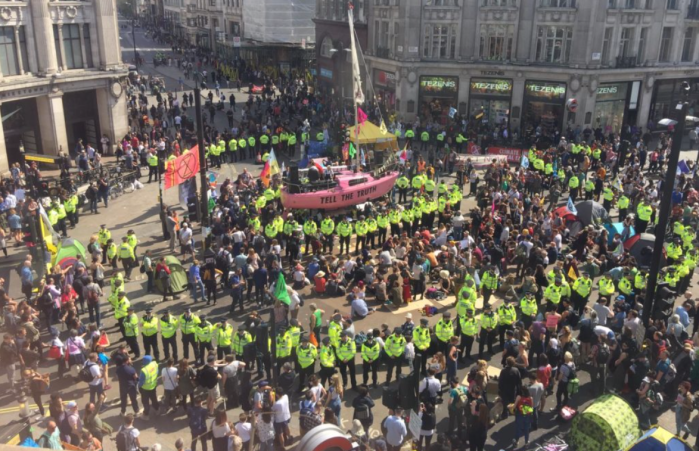
The Extinction Rebellion protests hit London in late April 2019. It is indeed heartening to see all the energy and commitment. Yet such activism raises many issues.
The problem with action-based protest movements is not only that they have to keep upping the ‘ante’ to sustain interest and make an impact, risking, in the process, mass arrests, debilitating fines from the courts and possible alienation of the unconverted.
There is also the problem of practicable goals and the best means to achieve. It is all very well to pick a somewhat arbitrary date and simply proclaim that we must achieve net zero CO2 emissions by then. But it is another matter altogether to show how that can be done by, say, 2025, especially when, to have any meaning, other states would have to be doing more or less the same thing.
That could cause massive production bottlenecks and logistical nightmares, not to overlook possible political backlashes because of sudden changes to existing lifestyle patterns (new waves of demonstrations by groups in the footsteps of the Gilets Jaunes and Bonnets Rouges, ballot box revolts, strikes by fuel tanker drivers and other key workers, and speculation-driven currency crises… ).
Then there is the capacity of our political institutions to play their part. They have utterly failed to deal with the comparatively simple problem of Brexit. ER proposes a Citizens Assembly instead. It is not clear how it would avoid becoming a chaotic Tower of Babel, with many assembly members speaking, for example, the language of more growth, others talking about degrowth and steady-state economics.
Presumably, groups such as the trade unions and chambers of commerce would be invited to send representatives. That could create a big lobby for airport expansion, more nuclear power plants and other giant infrastructure projects, all ravenous consumers of energy and raw materials, not least cement and concrete, ie more CO2 emissions and other negative impacts.
It is equally unclear how such an assembly would deal with the complexities of selecting what elements of schemes for, say, bioenergy and carbon capture (BECCS) or hydrogen fuel are practicable and truly sustainable in terms of total ecosystem impacts. It is all very well to proclaim a renewable energy revolution but there are questions to answer about problems such as demand for rare earth elements, variability, low power density and associated land take.
The activism of ER has pushed climate breakdown far up the agenda. To date, climate campaigners have largely failed but things might be changing thanks to ER (and David Attenborough!). Yet activity on the ground is not enough. We meet ‘theory’. It might be surmised that many climate activists in London today see theory as so much hot air, akin to medieval scholars debating how many angels could fit on the head of a pin. It is indeed true that much theorising is removed from the real world and often there is sectarian disputation over the most trivial and arcane differences.
Yet theory and related debate, constructively conducted, really matter. Without values clarification, we will not know what are good goals. Without analysis, we won’t know in sufficient depth what are the key threats and what lies beneath them. Also, without analysis, we won’t be able to separate good policies from bad ones. Is, for example, the so-called ‘Green New Deal’ still fiddling about or something really worthwhile. Only theory can tell us. To take another example, the rewilding movement has hit some difficult choices (which reintroductions etc). It need theory to resolve them.
Without strategic and tactical thought, we won’t know what are the best opportunities and best ways to exploit them. Should we stick to pressure groups, reform a mainstream party or try to build independent parties such as the Greens. Should we support the ‘lesser evil’? It is theory that can shed light on the best options We need to analyse careful the appeal of climate deniers so we can find ways to counter it.
Good theory can however emerge through thorough, robust but still constructive debate. That debate will probably be more productive in participants are agreed on certain basics. Good theory further provides the vision of a better world without which it is easy to give up, such are the disappointments of activism. But good ideas — a compelling vision — can help to keep up one’s efforts. If we cease to make them, disaster must follow. If we keep up the fight there’s still a change, even if now a slim one.
So, it is not either/or, ideas and debate versus action. If I have to have surgery (‘practice’), I’d prefer to have a surgeon who knows something of the human body (‘theory’).
You must be logged in to post a comment.